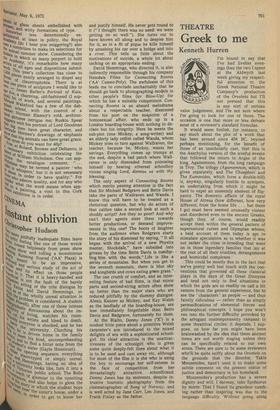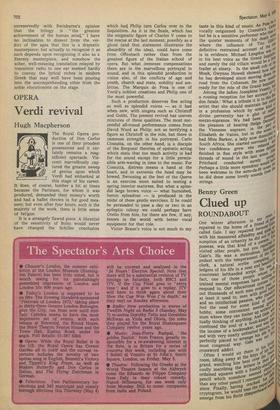THEATRE
Greek to me
Kenneth Hurren I'm bound to say that I've had livelier evenings than the two I spent at the Aldwych last week giving my respectful attention to the Greek National Theatre Company's production of the Oresteia but I'll not pretend that this is any sort of serious value judgement, and I'm not sure where I'm going to look for one of those. The occasion is one that more or less defeats most of a reviewer's standard formulae. It would seem foolish, for instance, to say much about the plot of a work that has been around since 458 BC, beyond perhaps mentioning, for the benefit of those of an unscholarly cast, that this is the Aeschylus version of the woeful events that followed the return to Argos of the king, Agamemnon, from the long campaign in Troy. The trilogy (Agamemnon, which is given separately, and The Choephori and The Eumenides, which form a double-bill) is, anyway, singularly hostile to synopsis, an undertaking from which it might be hard to expel an unseemly element of flippancy. The domestic affairs of the royal House of Atreus (how different, how very different, from the home life . . but there I go) must have seemed unusually violent and disordered even to the ancient Greeks, though they, of course, would readily accept them within the general pattern of supernatural curses and Olympian whims; a bald account of them today is apt to stimulate speculation as to whether it was not rather the close in-breeding that went on in those legendary families that lay at the root of all their troubles, derangements and homicidal complexes. This could be mostly due to the fact that we've pretty well lost touch with the conventions that governed all these classical plays in the days of the Great Dionysia and tend not only to find situations in which the gods are so readily on call a bit remote from the general experience, but to see the 'characters' as people — and thus faintly ridiculous — rather than as simply personifications of elemental forces and philosophical concepts. I hope you won't run into the further difficulty provoked by the arrogant contemporaneity rampant in some theatrical circles: it depends, I suppose, on how far you might have been brainwashed by the idea that these ancient items are not worth staging unless they can be specifically related to our own scene. There are sure to be some reviewers who'll be quite sniffy about the Oresteia on the grounds that the director, Takis Mouzenides, hasn't used it to make some subtle comment on the present status of justice and democracy in his homeland. Mouzenides's production has a severe dignity and will, I daresay, take Epidaurus by storm. That I found its grandeur numbing rather than inspiring was due to the language difficulty. Without going along unreservedly with Swinburne's opinion that the trilogy is " the greatest achievement of the human mind," I have no inclination to dissent from the verdict of the ages that this is a dramatic masterpiece; but actually to recognise it as such depends upon recognising it also as a literary masterpiece, and somehow the sober, well-meaning translation relayed by transistor radio to one ear seemed hardly to convey the lyrical riches in modern Greek that may well have been pouring into the uncomprehending other from the noble elocutionists on the stage.











































 Previous page
Previous page